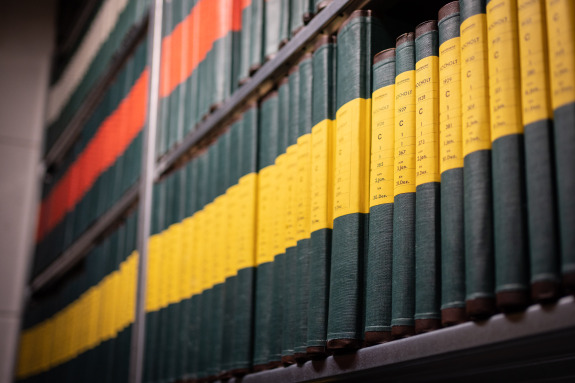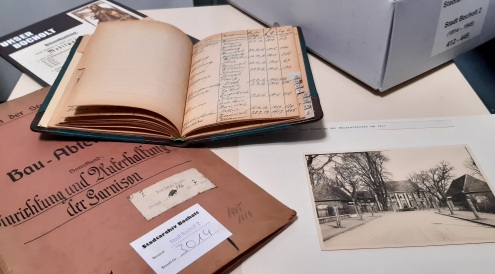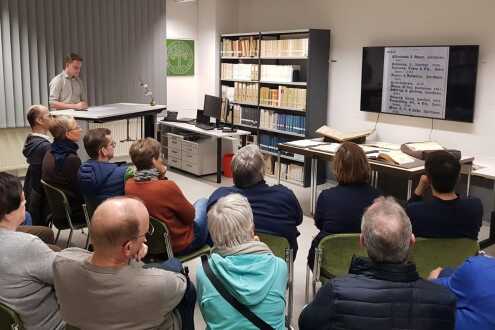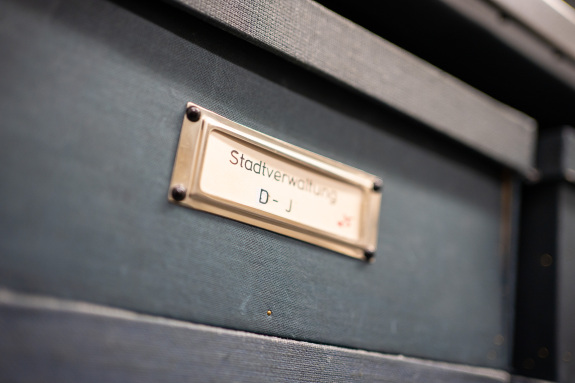Yesterday and today: Bocholt's town history
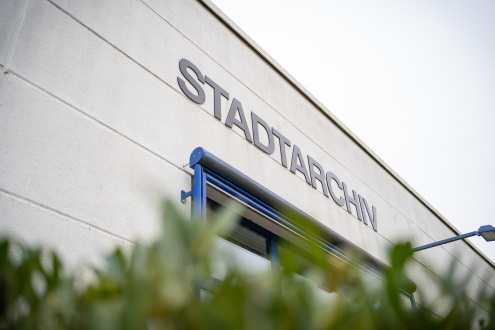
The Bocholt City Archive is the "memory of the city". As such, it has the task of selecting from the completed written documents of the Bocholt City Council and administration and the Liedern-Werth office, which was dissolved in 1975, those that are important for researching the city's history or for legal, cultural and/or historical reasons, and to secure them permanently and make them available to the interested public.
From medieval documents to e-mails, the city archive has more than 800 years of city history. The city archive is therefore the place to go for all questions about Bocholt's history.
We look forward to your visit and will be happy to assist you with your questions and provide guidance in working with the diverse sources.
Enquiry to the city archive
Do you have a question about the history of the town or a Bocholt family?
The link below or the adjacent QR code will take you to our enquiry form.
The stocks
The archive's holdings are diverse and cover the period since the 13th century. The oldest archive document is a document issued by the Bishop of Münster in 1201, while the most recent archive document is this morning's daily newspaper.
The city archive holds the official records of the city of Bocholt as well as those of the former Liedern-Werth office (until 1975) and its legal predecessors. The archive is constantly growing thanks to ongoing donations from the city administration, in the near future in the form of e-files.
In order to expand the future historical picture, private sources are also taken over, recorded, stored and catalogued in addition to these municipal documents. These are non-official sources (e.g. regional newspapers, estates of important personalities of the city, club and company archives) as well as historical and local history collections (e.g. maps, photos, films, posters, etc.).
What collections are there in the city archive?
In total, the holdings of the Bocholt city archives comprise around 1.2 kilometres of shelving, and the trend is rising:
including
- around 13,000 files and processes
- around 820 documents
- 750 official records
- around 1,050 maps and plans
- 950 posters
- Daily newspaper "Bocholter-Borkener Volksblatt" since 1875 (with gaps)
- Civil registers from 1874
- Church records of the parish of St. Georg from 1654 in copy
- Around 20,000 photos on the history of the town of Bocholt
- 28 estates
and much more!
You can view a detailed overview of the holdings online: Portal Archive.NRW (click here).
The archive holdings can be viewed free of charge in the reading room during opening hours.
Holdings online
Some of the archive's holdings are available online in the Archive.NRW portal (click here) and can be researched there.
We are constantly working on putting our holdings online and will upload further finding aids in the future.
Public relations
As the "memory of the city", the city archive not only has the task of storing knowledge, but also the task of communicating historical awareness.
In addition to ongoing projects such as the photo of the month, the Bocholt city history discussion group or the publication series "Our Bocholt" (together with the Verein für Heimatpflege Bocholt e. V.) and "Bocholter Quellen und Beiträge", the city archive also participates in city history projects such as the Bocholt picture panels.
For interested members of the public, the city archive offers free guided tours of the stacks on request, with an introduction to the variety of sources available, research techniques and the use of unique sources.
Educational work
As the "memory of the city", the city archive not only has the task of storing knowledge, but also the task of communicating historical awareness.
As part of its active historical education work, the city archive thus makes an important contribution to the city's culture of remembrance. The city archive also sees itself as an extracurricular place of learning and can be thematically integrated into school lessons by means of a visit.
By prior arrangement, a wide variety of projects can be offered on a wide range of topics in terms of type and scope. In addition, the archive is available to support all pupils or students in the selection and preparation of specialised or term papers.
Visit to the Bocholt city archives
The use of the holdings of the Bocholt City Archives is open to anyone interested within the framework of the legal provisions, regardless of whether they are pursuing scientific research, have an official concern or wish to use the archives out of personal interest.
In principle, personal inspection is free of charge within the framework of the North Rhine-Westphalian Archive Act and the municipal archive statutes.
However, fees are charged for special services such as research by archive staff, as well as for reproductions - except for scientific/school purposes.
Guided tours of the stacks can be arranged free of charge for groups, with an introduction to the variety of sources available, research techniques and the use of unique sources.
Advance booking is recommended so that we can prepare your visit to the archive in the best possible way and have the required archive materials ready.



